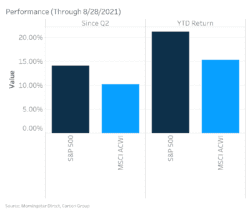Federal Reserve Chair Jerome Powell joined the chorus of Fed officials signaling the U.S. central bank would reduce its bond-buying program designed to keep long-term interest rates low and sustain the economy during the pandemic. After two strong jobs reports and generally positive economic news, Fed officials seem ready to reduce bond purchases later this year.
Key Points for the Week
- Federal Reserve Chair Jerome Powell signaled the Fed would reduce its bond-buying programs sometime this year.
- Personal expenditures grew just 0.3% as spending on goods dropped 1.1% from the previous month. Household income rose 1.1%.
- Existing and new home sales were nearly flat in July compared to a surge of demand last year.
The pace of reductions will likely be slow, and interest rate increases aren’t expected anytime soon. Personal spending grew just 0.3% last month even though incomes rose 1.1%. Rising COVID-19 cases limited increases in spending, and goods spending dropped 1.1%. Housing demand remains strong. Last month, existing and new home sales increased 2% and 1% respectively from already elevated levels. Goods spending and housing demand both accelerated early in the pandemic, making comparisons more difficult.
Stocks reacted positively to Powell’s communication, and the S&P 500 reached another all-time high. Last week, the S&P 500 added 1.5%. The MSCI ACWI surged 2.0%. The Bloomberg U.S. Aggregate Bond Index was virtually unchanged. August’s monthly employment report leads the list of economic releases this week.
Figure 1
Measuring Up
For today’s young adults, keeping their finances in order is likely more difficult than it was when today’s retirees were the same age. Social media has made it easier to compare our lives to a wider range of people. Rather than keeping in touch with some friends from high school and seeing the rest every five years at a reunion, we can get regular updates of our friends’ fabulous lives by following them on social media.
Not only are comparisons easier to make, but social media feeds also create unrealistic comparisons. What people share on social media is an idealized version of their lives that reflects their best experiences as they want them to be seen. That makes it a difficult comparison. And compare we must. According to social comparison theory, humans like to evaluate how they are doing, and when no objective measures exist, they will compare themselves to other people.
Investors can face the same challenge on a regular basis with performance numbers. Even though companies and markets are global, a tendency toward home bias causes many investors to compare their global portfolios to the performance of a domestic stock index, like the S&P 500.
When the S&P 500 is the dominant market performer, some investors start questioning how well their portfolio is performing even when its results remain solid compared to the global index. This year, the S&P 500 has gained more than 20%, while global stocks have climbed only 15.3%. But global stocks include the U.S. When the U.S. is stripped out, the MSCI ACWI ex U.S. has only increased 8.3% this year (Figure 1). Much of the poor international performance comes from China and its decision to tighten information sharing to the detriment of Chinese social media companies. The MSCI China Index has dropped 15.1% this year. These comparisons can also be more difficult when portfolios include bonds. The Bloomberg U.S. Aggregate Bond Index is down 0.7%, and that causes performance to drop more quickly as risk declines.
Rather than think about bonds hurting returns, investors should consider them as diversifying. Diversification is a key tool for managing risk, and bonds are doing a great job diversifying the risk in stocks. In 2021, taking risk in stocks, especially in the U.S., has been richly rewarded. But taking risks means other outcomes are possible. Because the economy bounced back quickly, stocks profited. If it hadn’t, bonds may have been key to managing downside.
Whether it’s your portfolio’s performance or your own perception of financial success, be careful you aren’t comparing yourself or your portfolio to an improper benchmark. People tend to compare themselves to people who are better off than they are. Doing so leaves them with more negative feelings, higher stress, and lower satisfaction. Comparisons to a broader and better set of benchmarks can lead to a more accurate reflection of how well you are doing and a better outcome.
—
This newsletter was written and produced by CWM, LLC. Content in this material is for general information only and not intended to provide specific advice or recommendations for any individual. All performance referenced is historical and is no guarantee of future results. All indices are unmanaged and may not be invested into directly. The views stated in this letter are not necessarily the opinion of any other named entity and should not be construed directly or indirectly as an offer to buy or sell any securities mentioned herein. Due to volatility within the markets mentioned, opinions are subject to change without notice. Information is based on sources believed to be reliable; however, their accuracy or completeness cannot be guaranteed. Past performance does not guarantee future results.
S&P 500 INDEX
The Standard & Poor’s 500 Index is a capitalization-weighted index of 500 stocks designed to measure performance of the broad domestic economy through changes in the aggregate market value of 500 stocks representing all major industries.
MSCI ACWI INDEX
The MSCI ACWI captures large- and mid-cap representation across 23 developed markets (DM) and 23 emerging markets (EM) countries*. With 2,480 constituents, the index covers approximately 85% of the global investable equity opportunity set.
Bloomberg U.S. Aggregate Bond Index
The Bloomberg U.S. Aggregate Bond Index is an index of the U.S. investment-grade fixed-rate bond market, including both government and corporate bonds.
https://www.psychologytoday.com/us/blog/loaded/201810/is-instagram-making-you-poor
https://www.bea.gov/sites/default/files/2021-08/pi0721.pdf
https://www.federalreserve.gov/newsevents/speech/powell20210827a.htm
https://www.nar.realtor/research-and-statistics/housing-statistics/existing-home-sales
https://www.census.gov/construction/nrs/pdf/newressales.pdf
https://www.psychologytoday.com/us/articles/201711/the-comparison-trap
Compliance Case # 01119115



